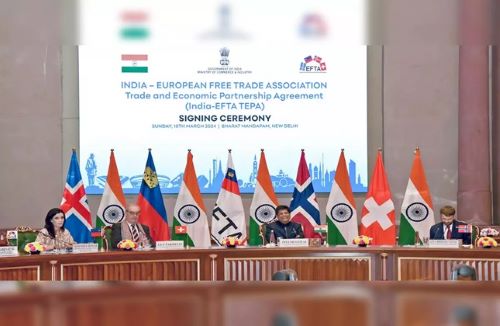Context:
The landscape of international trade and investment is continually evolving, marked by shifting priorities, strategic negotiations, and dynamic economic relationships. In the realm of global commerce, the recent India-EFTA trade deal emerges as a significant milestone, offering insights and lessons that reverberate beyond its immediate implications. Amidst the backdrop of ongoing parliamentary elections in India, the culmination of this historic agreement underscores the intricacies of contemporary trade diplomacy and the intertwined nature of trade and investment dynamics.
Investment Implications of the India-EFTA Trade Deal:
A notable feature that distinguishes the India-EFTA Free Trade Agreement (FTA) from recent agreements lies in its comprehensive approach towards investment. While previous FTAs primarily focused on trade facilitation, the inclusion of a detailed investment chapter in the India-EFTA FTA signifies a strategic shift. Unlike traditional investment protection clauses, this chapter emphasizes investment facilitation, reflecting a nuanced understanding of economic dynamics. Particularly noteworthy is India's achievement in securing commitments from EFTA countries to increase Foreign Direct Investment (FDI) and job creation within specified timeframes. By codifying these obligations of conduct, the agreement sets a precedent for future negotiations, fostering transparency and accountability in investment frameworks.
Furthermore, the incorporation of environmental and labor considerations within the FTA represents a departure from India's traditional stance on trade agreements. This progressive approach aligns with contemporary demands for sustainable development and responsible business practices. The India-EFTA FTA thus serves as a blueprint for balancing economic imperatives with social and environmental concerns, demonstrating the potential for synergistic growth in the global economy.
Integration of Trade and Investment:
The symbiotic relationship between trade and investment underscores the interconnectedness of modern economic systems. Historically, FTAs have encompassed both trade and investment provisions, reflecting the intrinsic linkages between these domains. However, India's FTA 2.0 approach witnessed a departure from this model, opting to separate trade and investment negotiations. While this strategy offered flexibility in addressing specific issues, it also raised questions regarding coherence and effectiveness in economic diplomacy.
The India-EFTA FTA heralds a potential realignment towards a comprehensive approach, wherein trade and investment considerations are integrated into a single framework. By embedding investment provisions within the trade agreement, India acknowledges the synergies between these spheres and the need for a holistic approach to economic engagement. This strategic shift signifies a maturation in India's FTA policy, aligning it with global trends and best practices.
Towards FTA 3.0:
As India navigates the complexities of international trade and investment, a clear and coherent FTA policy becomes imperative for maximizing economic benefits. The emergence of FTA 3.0 paradigm underscores the evolution towards a more integrated and strategic approach. Central to this paradigm is the convergence of trade and investment negotiations within a comprehensive economic treaty, reflecting a nuanced understanding of interrelated economic dynamics.
In crafting its FTA policy, India must prioritize not only trade facilitation but also effective investment protection mechanisms. By expanding the scope of investment issues and ensuring robust dispute resolution mechanisms, India can enhance investor confidence and catalyze economic growth. Moreover, a comprehensive FTA policy serves as a strategic tool for leveraging negotiation leverage, enabling India to secure favorable terms while fostering mutually beneficial partnerships.
Conclusion:
The India-EFTA FTA stands as a testament to the evolving dynamics of international trade and investment. By integrating investment provisions within the trade agreement and prioritizing sustainable development goals, India demonstrates a commitment to progressive economic diplomacy. As the global economic landscape continues to evolve, India's embrace of a comprehensive FTA policy holds immense potential for catalyzing growth and fostering resilient partnerships on the world stage.
|
Probable Questions for UPSC Mains Exam 1. Discuss the significance of the integration of investment provisions within the India-EFTA Free Trade Agreement (FTA). How does this strategic shift reflect evolving trends in international trade diplomacy, and what lessons can other nations draw from India's approach?(10 marks, 150 words) 2. Critically analyze the implications of India's FTA 3.0 paradigm, as exemplified by the India-EFTA FTA. In light of the interconnectedness between trade and investment, evaluate the feasibility and effectiveness of integrating these components within a comprehensive economic treaty, and its potential impact on India's economic growth trajectory.(15 marks, 250 words) |
Source – The Hindu







